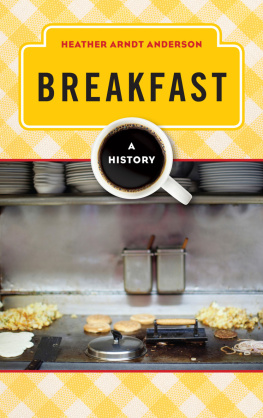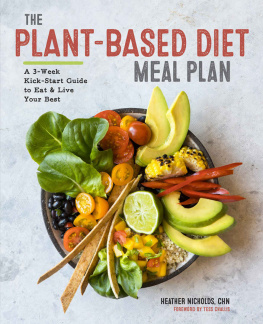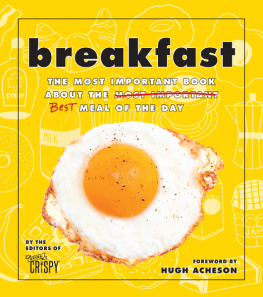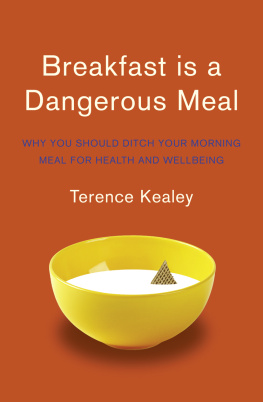Heather Arndt Anderson - Breakfast: a history
Here you can read online Heather Arndt Anderson - Breakfast: a history full text of the book (entire story) in english for free. Download pdf and epub, get meaning, cover and reviews about this ebook. year: 2013, publisher: AltaMira Press, genre: Non-fiction. Description of the work, (preface) as well as reviews are available. Best literature library LitArk.com created for fans of good reading and offers a wide selection of genres:
Romance novel
Science fiction
Adventure
Detective
Science
History
Home and family
Prose
Art
Politics
Computer
Non-fiction
Religion
Business
Children
Humor
Choose a favorite category and find really read worthwhile books. Enjoy immersion in the world of imagination, feel the emotions of the characters or learn something new for yourself, make an fascinating discovery.
- Book:Breakfast: a history
- Author:
- Publisher:AltaMira Press
- Genre:
- Year:2013
- Rating:4 / 5
- Favourites:Add to favourites
- Your mark:
- 80
- 1
- 2
- 3
- 4
- 5
Breakfast: a history: summary, description and annotation
We offer to read an annotation, description, summary or preface (depends on what the author of the book "Breakfast: a history" wrote himself). If you haven't found the necessary information about the book — write in the comments, we will try to find it.
Breakfast: a history — read online for free the complete book (whole text) full work
Below is the text of the book, divided by pages. System saving the place of the last page read, allows you to conveniently read the book "Breakfast: a history" online for free, without having to search again every time where you left off. Put a bookmark, and you can go to the page where you finished reading at any time.
Font size:
Interval:
Bookmark:
Breakfast
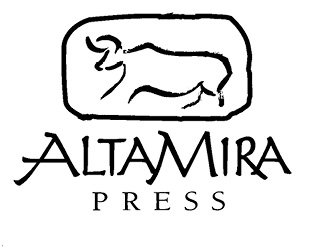
AltaMira Studies in Food and Gastronomy
General Editor: Ken Albala, Professor of History, University of the Pacific (kalbala@pacific.edu)
AltaMira Executive Editor: Wendi Schnaufer (wschnaufer@rowman.com)
Food Studies is a vibrant and thriving field encompassing not only cooking and eating habits but issues such as health, sustainability, food safety, and animal rights. Scholars in disciplines as diverse as history, anthropology, sociology, literature, and the arts focus on food. The mission of AltaMira Studies in Food and Gastronomy is to publish the best in food scholarship, harnessing the energy, ideas, and creativity of a wide array of food writers today. This broad line of food-related titles will range from food history, interdisciplinary food studies monographs, general interest series, and popular trade titles to textbooks for students and budding chefs, scholarly cookbooks, and reference works.
Appetites and Aspirations in Vietnam: Food and Drink in the Long Nineteenth Century , by Erica J. Peters
Three World Cuisines: Italian, Mexican, Chinese , by Ken Albala
Food and Social Media: You Are What You Tweet , by Signe Rousseau
Food and the Novel in Nineteenth-Century America , by Mark McWilliams
Man Bites Dog: Hot Dog Culture in America , by Bruce Kraig and Patty Carroll
New Orleans: A Food Biography , by Elizabeth M. Williams (Big City Food Biographies series)
A Year in Food and Beer: Recipes and Beer Pairings for Every Season , by Emily Baime and Darin Michaels
Breakfast: A History , by Heather Arndt Anderson (The Meals series)
Breakfast
A History
Heather Arndt Anderson
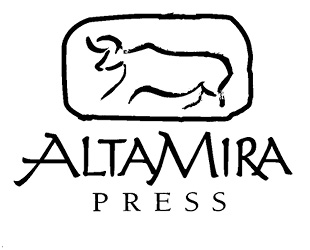
A division of
Rowman & Littlefield Publishers, Inc.
Lanham New York Toronto Plymouth, UK
Published by Rowman & Littlefield
4501 Forbes Boulevard, Suite 200, Lanham, Maryland 20706
www.rowman.com
10 Thornbury Road, Plymouth PL6 7PP, United Kingdom
Copyright 2013 by Rowman & Littlefield
All rights reserved. No part of this book may be reproduced in any form or by any electronic or mechanical means, including information storage and retrieval systems, without written permission from the publisher, except by a reviewer who may quote passages in a review.
British Library Cataloguing in Publication Information Available
Library of Congress Cataloging-in-Publication Data
Arndt Anderson, Heather, 1976
Breakfast : a history / Heather Arndt Anderson.
pages cm. (Studies in food and gastronomy (The meals series))
Includes bibliographical references and index.
ISBN 978-0-7591-2163-8 (cloth : alk. paper) ISBN 978-0-7591-2165-2 (ebook) 1. BreakfastsHistory. 2. Food habitsHistory. I. Title.
GT2850.A755 2013
394.1'252dc23
2013008495
 The paper used in this publication meets the minimum requirements of American National Standard for Information SciencesPermanence of Paper for Printed Library Materials, ANSI/NISO Z39.48-1992.
The paper used in this publication meets the minimum requirements of American National Standard for Information SciencesPermanence of Paper for Printed Library Materials, ANSI/NISO Z39.48-1992.
Printed in the United States of America
Contents
Series Foreword
Custom becomes second nature, and this is especially true of meals. We expect to eat them at a certain time and place, and we have a set of scripted foods considered appropriate for each. Bacon, eggs, and toast are breakfast; sandwiches are lunch; meat, potatoes, and vegetables are dinner, followed by dessert. Breakfast for dinner is so much fun precisely because it is out of the ordinary and transgressive. But meal patterns were not always this way. In the Middle Ages people ate two meals, the larger in the morning. Today the idea of a heavy meal with meat and wine at 11:00 a.m. strikes us as strange and decidedly unpleasant. Likewise when abroad, the food that people eat, at what seems to us the wrong time of day, can be shocking. Again, our customs have become so ingrained that we assume they are natural, correct, and biologically sound.
The Meals series will demonstrate exactly the opposite. Not only have meal times changed, but the menu as well, both through history and around the globe. Only a simple bowl of soup with a crust of bread for supper? That is where the name comes from. Our dinner, coming from disner in Old French, disjejeunare in Latin, actually means to break fast and was eaten in the morning. Each meal also has its own unique characteristics that evolve over time. We will see the invention of the picnic and barbecue, the gradual adoption of lunch as a new midday meal, and even certain meals practiced as hallowed institutions in some places but scarcely at all elsewhere, such as teathe meal, not the drink. Often food items suddenly appear in a meal as quintessential, such as cold breakfast cereal, the invention of men like Kellogg and Post. Or they disappear, like oysters for breakfast. Sometimes an entire meal springs from nowhere under unique social conditions, like brunch.
Of course, the decay of the family meal is a topic that deeply concerns us, as people catch a quick bite at their desk or on the go, or eat with their eyes glued to the television set. If eating is one of the greatest pleasures in life, one has to wonder what it says about us when we wolf down a meal in a few minutes flat or when no one talks at the dinner table. Still, mealtime traditions persist for special occasions. They are the time we remind ourselves of who we are and where we come from, when grandmas special lasagna comes to the table for a Sunday dinner, or a Passover Seder is set exactly the same way it has been for thousands of years. We treasure these food rituals precisely because they keep us rooted in a rapidly changing world.
The Meals series examines the meal as both a historical construct and a global phenomenon. A single meal in each volume is anatomized, its social and cultural meaning brought into sharp focus, and the customs and manners of various people are explained in context. Each volume also looks closely at the foods we commonly include and why. In the end I hope you will never take your mealtime customs for granted again.
Ken Albala
University of the Pacific
Acknowledgments
To my dear husband Scott and little son Zephyr, thank you for giving me an opportunity to put my boring environmental consulting career on the back burner so that I would have time for this.
To my editors Ken Albala and Wendi Schnaufer, I appreciate all of your sensible feedback and cheerleading, and I have learned so much through this process.
Thank you to my writing group, who tirelessly workshopped every page: Dana Cuellar, Art Edwards, Sarah Gilbert, Laurel Hermanson, David Lindenbaum, Rebecca Kelley, Mark Russell, and Michael Zeiss. I could not have done this without your invaluable, diverse input, and I am a better writer because of you.
Big thanks to the Multnomah County Library, for allowing me to flood your online interlibrary loan system with requests for obscure 19th-century housekeepers guides and war-era magazine articles, I owe you my gratitude. You are worth every tax dollar.
Speaking of tax dollars, thank you, U.S. School Breakfast Program, for ensuring I had a (free) hot morning meal every school day.
Introduction
Whether a bowlful of cloying, artificially fruit-flavored Os with milk, or a stinking pile of fermented soybeans on steamed rice, breakfast fuels hungry brains. As the old adage says, breakfast is the most important meal of the day. It is the meal that makes the champion. Breakfast literally breaks the fast of nighttime slumber, filling ones raging belly and providing the stamina to face the day. From the development of agriculture and the use of stone grinding tools in the Neolithic to the hardboiled eggs and Malt-O-Meal in todays kitchens, much of what is eaten for breakfast has changed curiously little. Human attitudes toward breakfast have, however, changed plenty.
Font size:
Interval:
Bookmark:
Similar books «Breakfast: a history»
Look at similar books to Breakfast: a history. We have selected literature similar in name and meaning in the hope of providing readers with more options to find new, interesting, not yet read works.
Discussion, reviews of the book Breakfast: a history and just readers' own opinions. Leave your comments, write what you think about the work, its meaning or the main characters. Specify what exactly you liked and what you didn't like, and why you think so.

